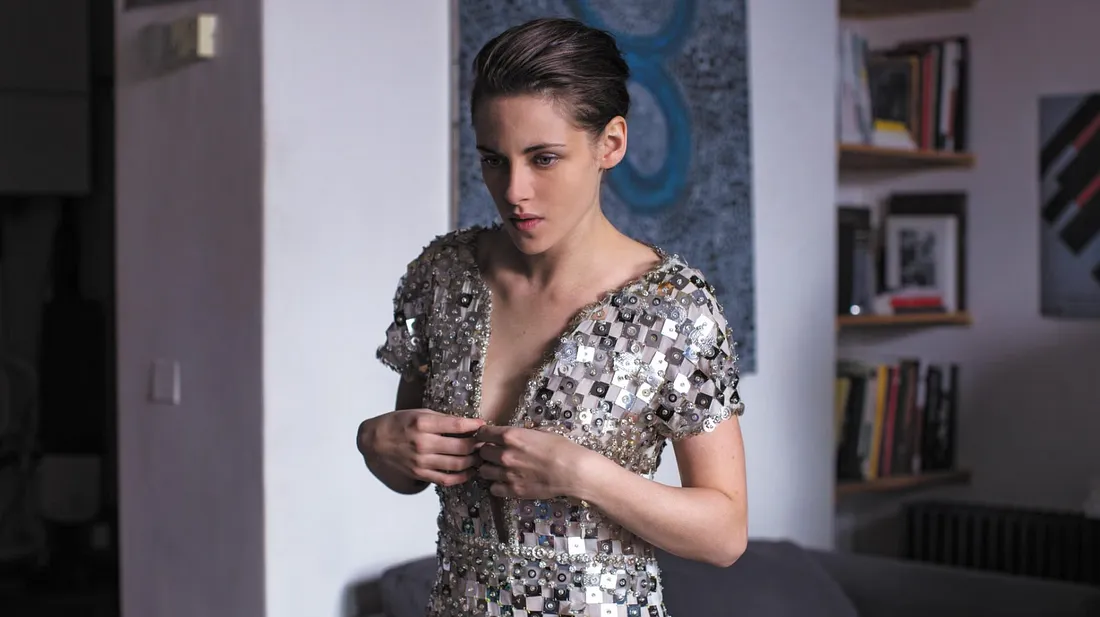Personal Shopper
dir. Olivier Assayas, 2016

I awoke thinking of the artist Hilma af Klint, whose work is said to have been formed through her communion with spirits. It was a thought arc that led me to revisiting Olivier Assayas’ 2016 Cannes-winner Personal Shopper. The Swedish painter and spiritualist plays a fitting role in assembling the movie’s ghostly thematics, as well as its meditation on ‘technological avant-garde’.
In a Parisian café, American Maureen Cartwright (Kristen Stewart) meets with potential buyers of her late twin brother Lewis’ house. Both are self-professed mediums, however Maureen is less certain of her spiritualist abilities. She is attempting to pinpoint a restless presence in the home — potentially her twin — and neutralise it before the purchase is finalised. A buyer recommends Klint’s studies as a way into the psychic process. This reference establishes the movie’s foundational thesis: connection and disconnection in a digital age that lacks a profound spiritual dimension.
Maureen orders a Klint book online and is pictured watching YouTube videos about the artist on the métro. I’m a fan of media that abides by current technological habits. (She tucks her earphone cables under her sweater so that the buds aren’t yanked out during transit.) A pivotal setpiece hinges on a back-and-forth texting exchange with an unknown number that on paper might not intrigue, but in play works as an eerie force driving plot and tension. Another instance involving technology that soon incriminates Maureen is a late-night googling session on her boss’ laptop. Corporeal, digital or ethereal — everything that once was leaves a trace.
In daylight hours Maureen works as the titular personal shopper. She is another in a line-up of Assayas characters who live on the fringe of celebrity (see: Clouds of Sils Maria, also featuring Stewart as an assistant to the stars). Maureen’s day-to-day is defined by superficial tasks undertaken for intolerable influencer boss Kyra (Nora von Waldstätten). She bikes around the metropolis retrieving fashion items for the shallow star. Rarely home when she drops by, lone indicators of her boss’ former residence are the bank notes she leaves for her employee on the kitchen table. Maureen stands in place for Kyra during her delayed arrival to a photoshoot; in the background haze of photographs we search for shadows and spirits, but Maureen remains turned away. Her occupation and relationships are trivialities that deny her communication with Lewis from the beyond. Waiting for his signal is the restless obsession that keeps her in Paris and withholds the closure she desires.
Maureen’s interactions with her boss are the first of many ‘missed’ connections. She maintains a relationship with long-distance partner Gary (Ty Olwin), with whom she convenes via benign but remote interactions over Skype. She meets Kyra’s icy, rejected boyfriend Ingo (Lars Eidinger); they philosophise about life and after-life with a cool detachment. Later, Maureen communes in hotel rooms at the invitation of her mystery texter but they never show up. Through messenger she confesses to them in a moment of vulnerability that she tries on her boss’ clothes without permission. They type back, drily, ‘Why are you telling me?’
Personal Shopper is concerned with portals, thresholds — and screens — that give access to second-hand communication with distant figures and residual feelings. To its protagonist these may be doors left ‘slightly ajar’ for otherworldly presences to enter this plane. Whether the cause of these hauntings is tethered to reality or the supernatural, however, is at the discretion of viewers. It seems plausible that Ingo, Kyra’s jealous lover, is the culprit leaving message trails luring Maureen into sordid hotel visitations in order to satisfy his own compulsions and fixations. Even so, she clings onto the far-out hope that it’s the soul of her deceased brother on the other end of the line.
Impressions made by Personal Shopper are not indefinite. Imprints fade and questions resist securing answers; they slip from fingers like morning-to-afternoon light crossing from one side of the room to the other. Likewise, the lights refracted when Maureen tries on Kyra’s mirrored dress; are they signals or merely shimmers? Interpretation can have solid-footing in our world or invite the spiritual. Abstract messaging could be a call from the other side, or solely the obfuscation of resolution. Indeed, as Maureen gazes into the camera in a final attempt at contact, she utters: ‘Is it you? Or, is it just me?’